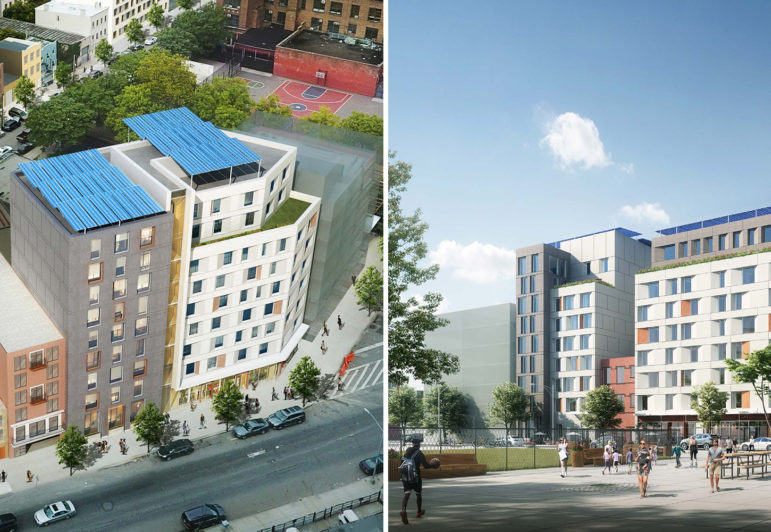
Magnusson Architecture and Planning/HPD
A city rendering of what Broadway Triangle will look like once development there is done.
• The push for tighter rent regulations is heating up: Make the Road New York was to rally Thursday with tenants outside a rent-stabilized building at 41-40 Denman Street in Elmhurst where they say “the ‘preferential rent’ loophole and the eviction bonus,” have put residents at risk of displacement. Preferential rent and the vacancy bonus are two elements of the rent-stabilization law—along with vacancy deregulation, major capital improvements and individual apartment improvements—at the heart of the effort by tenant advocates to deepen protections. A simultaneous effort to broaden the application of rent laws beyond the big cities to the entire state, dubbed “universal rent control,” is also underway.
• Meanwhile, the push against tighter rent regs has begun: Landlord groups launched what they called a “multi-million-dollar broadcast and cable television buy and digital advertising campaign” that relies on struggling small landlords to make the case that rent regulations have gone too far. “Over the past decade, building costs such as taxes, fuel and maintenance have increased by more than twice the rate of allowable rent increases,” the coalition, which includes the Rent Stabilization Association and the Real Estate Board of New York, said in a statement. “Proposals in Albany would make it even more difficult for landlords to be able to afford to maintain their buildings and individual units.”
• While the rent-regulation fight in Albany will heat up only after the budget, there are some housing issues on the table during the current round of budget talks. The Bring it Home Coalition, which is pressing for more money for mental-health housing, is holding rallies in Manhattan, Long Island and Buffalo on Thursday. They argue that the amount of money in the budget for such housing has remained static for too long.
• City housing agencies tabbed a sextet of organizations to build five new mixed-use buildings including 387 new apartments at Broadway Triangle in Brooklyn, a site where development plans under the Bloomberg administration triggered accusations of racism, a legal fight, a settlement and, now, a deal involving some of the same organizations that sued to stop the 2009 plan.
• The organization Housing Rights Initiative and Councilmember Ritchie Torres, who heads the oversight and investigations committee, released a report detailing how First Son-in-Law and presidential adviser Jared Kushner’s family company “has been operating illegal apartment buildings without inspections and mandatory certificates of occupancy” and had failed to pay fines for its violations. The Kushner company said it inherited the problems when it bought the buildings in question and was committed to correcting them.
Get the best of City Limits news in your inbox.
Select any of our free weekly newsletters and stay informed on the latest policy-focused, independent news.
• Has the mayor balked on a commitment made to elderly public housing residents? The Daily News editorial board this week indicated he has, dubbing it Bill’s “senior moment” (because, when battling for the needs of older New Yorkers, it helps to embrace the worst stereotypes about them). At issue is a deal the mayor and Council cut last Spring to spend $500 million on senior affordable housing. “The elegant idea is to create small new apartments for elderly NYCHA residents — freeing up the larger units where thousands, now empty-nesters, still live, and starting to dent the city’s 200,000-plus wait list for public housing,” the News wrote this week. The problem, says the News, is that the city recently told advocates it is “pursuing six sites that would altogether accommodate between 525 and 855 apartments for seniors” when $500 million should deliver as many as 3,000 apartments. “What happened here?” the News asks.
Well, it’s worth noting that the number of apartments in play has been fuzzy from the get-go. The News points to a Wall Street Journal headline back in June that said it would be “thousands” of apartments—but that very same WSJ story only reported “up to a thousand” were possible, which is a far cry from 3,000. The Council press release to which the News points notably says nothing about the number of units to be created; it just says the $500 million will be “targeted at 4 Housing Preservation and Development sites and 2 NYCHA sites”—which sounds precisely like the six sites the city says it’s working on.
It might be fair to fault the mayor for making a fuzzy commitment—which, in any case, fell far short of what some grassroots groups have long argued for—but it’s not clear that the delivery has fallen short of the city’s promise.








